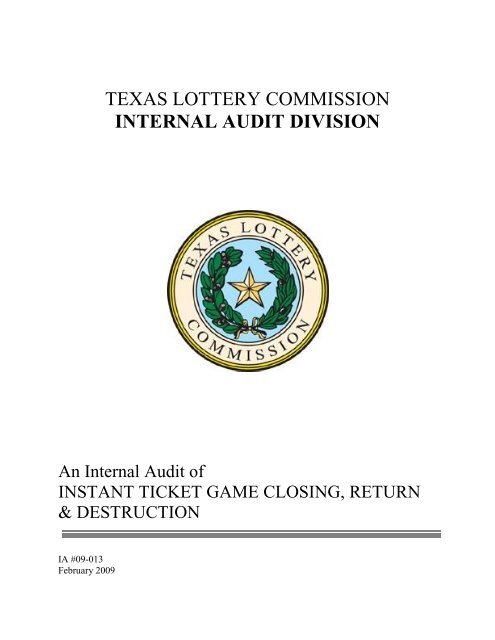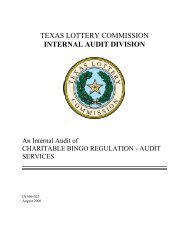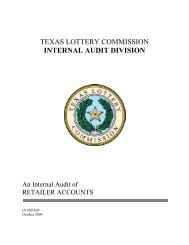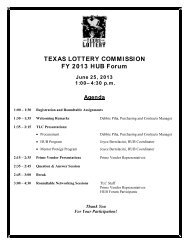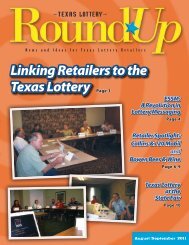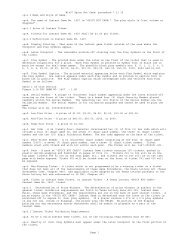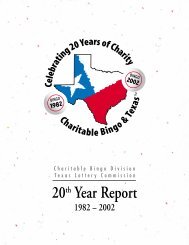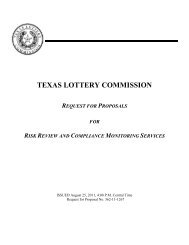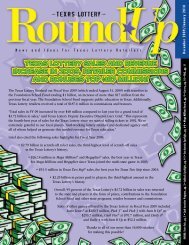Internal Audit of Instant Ticket Game Closing, Return ... - Texas Lottery
Internal Audit of Instant Ticket Game Closing, Return ... - Texas Lottery
Internal Audit of Instant Ticket Game Closing, Return ... - Texas Lottery
You also want an ePaper? Increase the reach of your titles
YUMPU automatically turns print PDFs into web optimized ePapers that Google loves.
TEXAS LOTTERY COMMISSION<br />
INTERNAL AUDIT DIVISION<br />
An <strong>Internal</strong> <strong>Audit</strong> <strong>of</strong><br />
INSTANT TICKET GAME CLOSING, RETURN<br />
& DESTRUCTION<br />
IA #09-013<br />
February 2009
<strong>Texas</strong> <strong>Lottery</strong> Commission<br />
<strong>Internal</strong> <strong>Audit</strong> Division<br />
<strong>Instant</strong> <strong>Ticket</strong> <strong>Game</strong> <strong>Closing</strong>, <strong>Return</strong> & Destruction<br />
TABLE OF CONTENTS<br />
EXECUTIVE SUMMARY ......................................................................................................................................... 1<br />
DETAILED REVIEW RESULTS .............................................................................................................................. 2<br />
I. CLOSING OF GAMES ..................................................................................................................................... 2<br />
a) Identifying <strong>Game</strong>s Needing <strong>Closing</strong> .................................................................................................. 2<br />
b) Initiating <strong>Game</strong> <strong>Closing</strong> Procedures................................................................................................. 2<br />
c) Accuracy <strong>of</strong> Number <strong>of</strong> Top Level Prizes Available .......................................................................... 3<br />
d) Steps Taken to End <strong>Ticket</strong> Sales <strong>of</strong> an <strong>Instant</strong> <strong>Game</strong> ........................................................................ 4<br />
II. TICKET RETURNS AND DESTRUCTION ................................................................................................... 4<br />
a) <strong>Instant</strong> <strong>Ticket</strong> <strong>Return</strong>s ....................................................................................................................... 4<br />
b) <strong>Instant</strong> <strong>Ticket</strong> Destruction ................................................................................................................. 6<br />
III. PROCESS LIMITATIONS ............................................................................................................................. 7<br />
a) Accounting <strong>of</strong> <strong>Instant</strong> <strong>Ticket</strong>s ............................................................................................................ 7<br />
AUDIT PURPOSE, SCOPE AND METHODOLOGY ............................................................................................ 9<br />
February 2009 i IA # 09-013
<strong>Texas</strong> <strong>Lottery</strong> Commission<br />
<strong>Internal</strong> <strong>Audit</strong> Division<br />
<strong>Instant</strong> <strong>Ticket</strong> <strong>Game</strong> <strong>Closing</strong>, <strong>Return</strong> & Destruction<br />
This page left intentionally blank.<br />
February 2009 ii IA # 09-013
<strong>Texas</strong> <strong>Lottery</strong> Commission<br />
<strong>Internal</strong> <strong>Audit</strong> Division<br />
<strong>Instant</strong> <strong>Ticket</strong> <strong>Game</strong> <strong>Closing</strong>, <strong>Return</strong> & Destruction<br />
EXECUTIVE SUMMARY<br />
The <strong>Texas</strong> <strong>Lottery</strong> Commission (TLC) <strong>of</strong>fers over 100 instant ticket games to the licensed<br />
retailers for sale to the public each year. TLC monitors the instant ticket games for performance<br />
as well as the number <strong>of</strong> top level prizes remaining to be claimed in each game to determine<br />
when a particular game should be closed. In March 2007, the <strong>Texas</strong> <strong>Lottery</strong> Commission<br />
implemented procedures to initiate the closing <strong>of</strong> an instant ticket game once all top level prizes<br />
have been claimed. This policy was adopted and formalized under <strong>Texas</strong> Administrative Code<br />
§401.302, effective June 2007. Since the implementation <strong>of</strong> this procedure through October<br />
2008, 41 <strong>of</strong> 163 games closed (25%) were closed as a result <strong>of</strong> all top level prizes being<br />
claimed 1 .<br />
The objective <strong>of</strong> this audit was to assess the effectiveness <strong>of</strong> controls for ensuring instant ticket<br />
games for which all top level prizes have been claimed are:<br />
1. Closed in accordance with commission policies and procedures, and<br />
2. <strong>Ticket</strong>s are returned and destroyed in accordance with the lottery operator contract and<br />
commission policies and procedures.<br />
Based on the results <strong>of</strong> our review and testing, controls provide reasonable assurance that<br />
instant ticket games in which all top level prizes have been claimed are closed, and tickets are<br />
returned and destroyed in accordance with commission policies and procedures. In addition, we<br />
present management recommendations to strengthen the current processes.<br />
<strong>Internal</strong> <strong>Audit</strong> would like to express our appreciation to the <strong>Lottery</strong> Operations Division and the<br />
Information Resources Department for their cooperation and assistance during this engagement.<br />
Their courtesy and responsiveness extended to <strong>Internal</strong> <strong>Audit</strong> allowed us to complete our work<br />
effectively and efficiently.<br />
1 These numbers represent games in which game closing procedures were initiated during March 28, 2007 – October<br />
31, 2008.<br />
February 2009 1 IA # 09-013
<strong>Texas</strong> <strong>Lottery</strong> Commission<br />
<strong>Internal</strong> <strong>Audit</strong> Division<br />
<strong>Instant</strong> <strong>Ticket</strong> <strong>Game</strong> <strong>Closing</strong>, <strong>Return</strong> & Destruction<br />
DETAILED REVIEW RESULTS<br />
<strong>Internal</strong> <strong>Audit</strong> reviewed the process for closing, returning and destroying instant tickets for those<br />
games in which all top level prizes have been claimed. The results <strong>of</strong> our review are presented<br />
below.<br />
I. CLOSING OF GAMES<br />
In March 2007, the <strong>Texas</strong> <strong>Lottery</strong> Commission implemented procedures to initiate the closing <strong>of</strong><br />
an instant ticket game once all top level prizes have been claimed. This policy was adopted and<br />
formalized under <strong>Texas</strong> Administrative Code §401.302, effective June 2007. Since the<br />
implementation <strong>of</strong> the procedures through October 2008, 41 <strong>of</strong> 163 games closed (25%) were<br />
closed as a result <strong>of</strong> all top level prizes being claimed 2 .<br />
a) Identifying <strong>Game</strong>s Needing <strong>Closing</strong><br />
The agency must timely and accurately identify when all top prizes for an instant game have<br />
been claimed. This enables TLC to begin game closing procedures and provides players<br />
additional information to make informed choices on which games to purchase.<br />
<strong>Internal</strong> <strong>Audit</strong> reviewed active games during the period <strong>of</strong> March 28, 2007 through October<br />
31, 2008 to determine if instant games in which all top level prizes had been claimed were<br />
identified and closing procedures were initiated in accordance with TLC procedures.<br />
Our testing confirmed TLC appropriately identified all games in which all top level prizes<br />
had been claimed and initiated closing procedures in accordance with approved agency<br />
procedures.<br />
b) Initiating <strong>Game</strong> <strong>Closing</strong> Procedures<br />
Per agency procedure 3 , a game‟s call date is “the Friday <strong>of</strong> the week in which the agency<br />
learns that all top prizes in the game have been claimed.” The call date is the <strong>of</strong>ficial<br />
initiation <strong>of</strong> game closing procedures and begins the 45 day timeline for ending ticket sales<br />
as required by TAC §401.302. The 45 th day is the <strong>of</strong>ficial close <strong>of</strong> game date and marks the<br />
end <strong>of</strong> the game. (Figure 1)<br />
2 These numbers represent games in which game closing procedures were initiated during March 28, 2007 – October<br />
31, 2008.<br />
3 <strong>Closing</strong> <strong>Instant</strong> <strong>Ticket</strong> <strong>Game</strong>s Procedure LO-PD-004, Effective September 13, 2007<br />
February 2009 2 IA # 09-013
<strong>Texas</strong> <strong>Lottery</strong> Commission<br />
<strong>Internal</strong> <strong>Audit</strong> Division<br />
<strong>Instant</strong> <strong>Ticket</strong> <strong>Game</strong> <strong>Closing</strong>, <strong>Return</strong> & Destruction<br />
<strong>Instant</strong> <strong>Ticket</strong> <strong>Game</strong> <strong>Closing</strong> When Top Prizes Claimed<br />
The Timeframe for <strong>Instant</strong><br />
<strong>Ticket</strong> Sales Varies<br />
The Call Date is<br />
the Friday <strong>of</strong> the<br />
week in which<br />
the agency<br />
learns that all<br />
top prizes have<br />
been claimed<br />
<strong>Lottery</strong> Operator<br />
Has 45 Days to<br />
Retrieve <strong>Ticket</strong>s<br />
After the Call Date<br />
<strong>Lottery</strong> Winners Have 180 Days<br />
After <strong>Game</strong> <strong>Closing</strong> to Redeem<br />
Their Prizes<br />
0 - 7<br />
Days<br />
45 Days 180 Days<br />
<strong>Instant</strong><br />
<strong>Game</strong><br />
Sales<br />
Begin<br />
Last<br />
Top<br />
Prize<br />
Claimed<br />
Call<br />
Date<br />
<strong>Game</strong> Closed –<br />
Official Sales End<br />
Last Day to<br />
Redeem<br />
<strong>Ticket</strong>s for<br />
Prizes<br />
Figure 1<br />
In order to determine if the games identified for closure were closed in accordance with TLC<br />
policies and procedures, <strong>Internal</strong> <strong>Audit</strong> recalculated the call date and the close <strong>of</strong> game date<br />
based on data provided by Information Resources. We recalculated the call date by<br />
reviewing the date the last top level prize was claimed and determining the date <strong>of</strong> the<br />
following Friday. This information was then used to determine the close <strong>of</strong> game date by<br />
adding 45 days. <strong>Internal</strong> <strong>Audit</strong> verified the calculated dates to the dates shown on documents<br />
provided by <strong>Lottery</strong> Operations. Based on these recalculations, <strong>Internal</strong> <strong>Audit</strong> determined<br />
that the call dates and the close <strong>of</strong> game dates were set in accordance with TLC policies and<br />
procedures.<br />
Because the procedure sets the call dates on a Friday, it is possible for the call dates to be<br />
several days after the date the last top level prize is claimed. As a result, the close <strong>of</strong> game<br />
dates are sometimes as many as 52 days after the last top level prize is claimed. This practice<br />
could create confusion regarding the timeline for closing a game.<br />
Recommendation: <strong>Internal</strong> <strong>Audit</strong> recommends TLC set the call date for games in which<br />
all top level prizes have been claimed as the same date TLC is aware the prize has been<br />
claimed or TLC should clarify the <strong>Instant</strong> <strong>Ticket</strong> <strong>Game</strong> Rules to provide transparency <strong>of</strong><br />
when the game closing timeframe begins.<br />
Management Response: Management agrees with the recommendation. The <strong>Lottery</strong><br />
Operations Products Department will modify the procedure, <strong>Closing</strong> <strong>Instant</strong> <strong>Ticket</strong><br />
<strong>Game</strong>s, LO-PD-004. The procedure will detail how games in which all top prizes have<br />
been claimed will be “called” on the same business day Products Department staff is<br />
aware the top prize has been claimed.<br />
Expected date for revision/approval <strong>of</strong> Procedure LO-PD-004 is March 2, 2009.<br />
c) Accuracy <strong>of</strong> Number <strong>of</strong> Top Level Prizes Available<br />
The accuracy <strong>of</strong> the number <strong>of</strong> prizes available for each instant ticket game is essential in<br />
TLC‟s ability to identify games that should be closed due to all top level prizes being<br />
claimed. To ensure the accuracy <strong>of</strong> the number <strong>of</strong> top level prizes available in the 41 instant<br />
games tested, <strong>Internal</strong> <strong>Audit</strong> compared the prize amount and number <strong>of</strong> prizes in PROSYS to<br />
the End <strong>of</strong> Production Prize Structure provided by the instant ticket manufacturer. <strong>Internal</strong><br />
February 2009 3 IA # 09-013
<strong>Texas</strong> <strong>Lottery</strong> Commission<br />
<strong>Internal</strong> <strong>Audit</strong> Division<br />
<strong>Instant</strong> <strong>Ticket</strong> <strong>Game</strong> <strong>Closing</strong>, <strong>Return</strong> & Destruction<br />
<strong>Audit</strong> confirmed that the prize amounts and the number <strong>of</strong> prizes in PROSYS matched the<br />
information from the instant ticket manufacturer for all games tested.<br />
d) Steps Taken to End <strong>Ticket</strong> Sales <strong>of</strong> an <strong>Instant</strong> <strong>Game</strong><br />
In accordance with the <strong>Closing</strong> <strong>Instant</strong> <strong>Ticket</strong> <strong>Game</strong>s procedure, when all top level prizes<br />
have been claimed, the <strong>Lottery</strong> Operations Products Department immediately places a<br />
graphic on the website informing the public that the instant game will be closing soon and<br />
sends a game closing announcement to the retailers and the <strong>Lottery</strong> Operator via a terminal<br />
message. The announcement states:<br />
The following game has had all <strong>of</strong> its top prizes claimed…. Stop selling this game<br />
immediately and remove POS. Remove the inventory from the dispensers and<br />
store it properly until your sales rep can pick it up on their next visit to your store.<br />
Upon receipt <strong>of</strong> this announcement, the <strong>Lottery</strong> Operator enters the game close date into<br />
PROSYS which stops any future shipments <strong>of</strong> the instant game to the retailers. In addition,<br />
the inventory reports available to the retailer and also utilized by the <strong>Lottery</strong> Operator‟s Sales<br />
Representatives (LSR) will indicate a „C‟ before the instant game number to immediately<br />
inform the retailer and the LSR that the game is closing and the game inventory should be<br />
returned. <strong>Internal</strong> <strong>Audit</strong> observed the End <strong>of</strong> <strong>Game</strong> Notice sent to retailers for <strong>Game</strong> No.<br />
1088, Triple Tripler, when game closing procedures were initiated. In addition, <strong>Internal</strong><br />
<strong>Audit</strong> observed the LSR‟s process for the removal <strong>of</strong> Triple Tripler from several retail<br />
locations. Through observation, <strong>Internal</strong> <strong>Audit</strong> verified the Products Department is notifying<br />
retailers <strong>of</strong> a game closing through terminal messages and the <strong>Lottery</strong> Operator through e-<br />
mails. <strong>Internal</strong> <strong>Audit</strong> also confirmed the LSRs are removing tickets for closing games from<br />
the retailer bins during their visits in accordance with the <strong>Lottery</strong> Operator‟s procedure.<br />
II. TICKET RETURNS AND DESTRUCTION<br />
a) <strong>Instant</strong> <strong>Ticket</strong> <strong>Return</strong>s<br />
Once games have been identified as having all top prizes claimed, it is essential tickets in the<br />
retailers‟ possession be retrieved from the retailers and are placed in returned in transit status.<br />
Retrieving ticket inventory ensures tickets are no longer available for sale. It is the <strong>Lottery</strong><br />
Operator‟s responsibility to retrieve closing game inventory during the 45 days from the call<br />
date to the close <strong>of</strong> game date. The day after the close <strong>of</strong> game date, TLC will auto-settle<br />
any packs <strong>of</strong> tickets that remain in the retailer‟s inventory 4 but have not been returned within<br />
the 45 days. The auto-settle process charges any outstanding tickets to the retailer‟s account.<br />
The <strong>Lottery</strong> Operations Retailer Services department will send the auto-settle information to<br />
the <strong>Lottery</strong> Operator directing them to retrieve these tickets. As stated above, <strong>Internal</strong> <strong>Audit</strong><br />
observed the <strong>Lottery</strong> Operator‟s process for retrieving closing game inventory. Additionally,<br />
<strong>Internal</strong> <strong>Audit</strong> performed an analysis <strong>of</strong> the retrieval <strong>of</strong> tickets from games closed due to all<br />
top level prizes being claimed. We found, 93.8% <strong>of</strong> tickets returned are placed in returned in<br />
transit status within 30 days <strong>of</strong> the game call date. Of the remaining packs returned, 5.4%<br />
4 <strong>Ticket</strong>s that are in confirmed or active status.<br />
February 2009 4 IA # 09-013
<strong>Texas</strong> <strong>Lottery</strong> Commission<br />
<strong>Internal</strong> <strong>Audit</strong> Division<br />
<strong>Instant</strong> <strong>Ticket</strong> <strong>Game</strong> <strong>Closing</strong>, <strong>Return</strong> & Destruction<br />
were placed in returned in transit status within 45 days and less than 1% was placed in<br />
returned in transit status after 45 days. (Figure 2)<br />
12,000,000<br />
10,000,000<br />
<strong>Ticket</strong>s Placed in<br />
<strong>Return</strong>ed - In Transit Status<br />
77.3%<br />
8,000,000<br />
6,000,000<br />
Number <strong>of</strong> <strong>Ticket</strong>s<br />
4,000,000<br />
2,000,000<br />
0<br />
16.5%<br />
5.4%<br />
.8%^<br />
1-15 days* 16-30 days 31-45 days After 45 days<br />
93.8% <strong>of</strong> <strong>Ticket</strong>s Were Placed in <strong>Return</strong>ed - In Transit Status**<br />
Within 30 days <strong>of</strong> <strong>Closing</strong> Procedures Being Initiated<br />
*from Call date<br />
^0.4% <strong>of</strong> these tickets may be included on the auto-settle report that the agency is able to track.<br />
**<strong>Ticket</strong>s picked up from the retailers by the <strong>Lottery</strong> Operator's Sales Representative; effectively removing the tickets from sale<br />
Figure 2<br />
<strong>Internal</strong> <strong>Audit</strong> noted opportunities to strengthen the current processes regarding retrieval <strong>of</strong><br />
closing game ticket inventory. While the <strong>Lottery</strong> Operator performs analysis <strong>of</strong> game<br />
inventory retrieval by its LSRs, at the time <strong>of</strong> our audit, TLC did not monitor the <strong>Lottery</strong><br />
Operator‟s retrieval <strong>of</strong> game inventory. Nor did TLC perform an analysis <strong>of</strong> tickets returned<br />
after the close <strong>of</strong> game date. However, TLC management has recently drafted procedures to<br />
better monitor the <strong>Lottery</strong> Operator‟s retrieval <strong>of</strong> closing game ticket inventory.<br />
Recommendation: We recommend TLC adopt procedures to monitor the <strong>Lottery</strong><br />
Operator‟s retrieval <strong>of</strong> the tickets during the 45 day timeframe. We further recommend<br />
TLC perform analysis <strong>of</strong> the auto-settle reports as well as packs returned after the 45th<br />
day to identify any trends <strong>of</strong> retailers who repeatedly do not have all tickets returned<br />
within the 45 days and/or the <strong>Lottery</strong> Operator‟s districts that repeatedly do not have all<br />
tickets returned within the 45 days. This will allow TLC to take appropriate action to<br />
ensure tickets are returned within the 45 days.<br />
February 2009 5 IA # 09-013
<strong>Texas</strong> <strong>Lottery</strong> Commission<br />
<strong>Internal</strong> <strong>Audit</strong> Division<br />
<strong>Instant</strong> <strong>Ticket</strong> <strong>Game</strong> <strong>Closing</strong>, <strong>Return</strong> & Destruction<br />
Management Response: Management agrees with the recommendation. The <strong>Lottery</strong><br />
Operations Retailer Services Department will develop procedures and reports to monitor<br />
the retrieval <strong>of</strong> tickets during the 45 day timeframe after the call <strong>of</strong> a game to ensure that<br />
ticket collection is proceeding in a manner consistent with ensuring the 45 day retrieval<br />
period. Retailer Services will also develop procedures and reports to analyze the autosettle<br />
process and identify trends related to individual retailers and sales districts that<br />
repeatedly do not have tickets returned within 45 days from the call <strong>of</strong> a game. Retailer<br />
Services will utilize this information to work with retailers and the <strong>Lottery</strong> Operator on<br />
the timely return <strong>of</strong> tickets during the call period.<br />
Expected date for revision/approval <strong>of</strong> LO-RS-110 is April 3, 2009. The procedure<br />
revisions will address both return monitoring and auto settle analysis. Work with<br />
retailers and the <strong>Lottery</strong> Operator related to ensuring timely return <strong>of</strong> tickets will be<br />
ongoing.<br />
In addition, as stated earlier, TLC is reliant upon the <strong>Lottery</strong> Operator to timely retrieve<br />
closing game inventory to minimize the opportunity for closed games to be sold. This is<br />
particularly significant for games in which all top level prizes have been claimed. While our<br />
testing and observations confirm the <strong>Lottery</strong> Operator retrieved closing game inventory<br />
within the 45 day timeframe and instituted controls to assist their ongoing conformance, it is<br />
important that TLC is able to enforce this requirement should the <strong>Lottery</strong> Operator fail to<br />
meet the mandated timeframe in the future.<br />
Recommendation: We recommend management ensure the requirement for the <strong>Lottery</strong><br />
Operator to retrieve closing game tickets within 45 days is enforceable.<br />
Management Response: Management agrees with the recommendation. The <strong>Lottery</strong><br />
Operations Retailer Services Department will utilize the reports and procedures outlined<br />
in the prior management response to monitor the performance <strong>of</strong> the <strong>Lottery</strong> Operator in<br />
ensuring the 45-day timeframe is being administered properly. Additionally,<br />
management is contracting with an external vendor to monitor performance and<br />
compliance on the part <strong>of</strong> the <strong>Lottery</strong> Operator. Management will ensure that the vendor<br />
routinely evaluates the performance <strong>of</strong> the lottery operator related to these requirements.<br />
Expected date for revision/approval <strong>of</strong> LO-RS-110 is April 3, 2009. Performance<br />
monitoring <strong>of</strong> contractual requirements will be ongoing. A contract is being initiated<br />
currently with a vendor to perform lottery operator performance and compliance<br />
monitoring. <strong>Lottery</strong> Operations and Administration will work with the new vendor to<br />
ensure that this requirement is reviewed in the early stages <strong>of</strong> work beginning under this<br />
contract.<br />
b) <strong>Instant</strong> <strong>Ticket</strong> Destruction<br />
To ensure instant tickets are destroyed in accordance with agency policies and procedures,<br />
<strong>Internal</strong> <strong>Audit</strong> observed the destruction process. In the destruction <strong>of</strong> instant tickets, TLC<br />
warehouse staff do not distinguish between those games closed due to all top prizes having<br />
been sold and those games closed due to other reasons. According to agency procedure 5 ,<br />
tickets which have been verified as returned by TLC warehouse staff are stored according to<br />
5 Releasing <strong>Instant</strong> <strong>Ticket</strong> Inventory for Destruction Procedure LO-RS-075, Effective October 20, 2008<br />
February 2009 6 IA # 09-013
<strong>Texas</strong> <strong>Lottery</strong> Commission<br />
<strong>Internal</strong> <strong>Audit</strong> Division<br />
<strong>Instant</strong> <strong>Ticket</strong> <strong>Game</strong> <strong>Closing</strong>, <strong>Return</strong> & Destruction<br />
the verification date and “are eligible for destruction 90 days after sanctions are charged for<br />
non-conforming and/or omitted tickets.”<br />
When tickets are eligible for destruction, warehouse staff receive approval from TLC<br />
management to destroy the tickets and coordinate the destruction with the <strong>Lottery</strong> Operator<br />
staff and the shredding facility. To ensure all tickets are actually destroyed at the shredding<br />
facility, the <strong>Lottery</strong> Operations Security Department provides witness and observation <strong>of</strong> the<br />
destruction process beginning at the <strong>Lottery</strong> Operator warehouse and ending at the shredding<br />
facility.<br />
Our observation confirmed that instant tickets were destroyed in accordance with agency<br />
policies and procedures.<br />
III. PROCESS LIMITATIONS<br />
<strong>Instant</strong> <strong>Ticket</strong> <strong>Game</strong> Rules 6 state “the procedure shall provide for ending ticket sales in an instant<br />
game within 45 days after game closing procedures have been initiated” and further states “no<br />
tickets in an instant game may be sold after the instant<br />
game closing date.” However, in practice TLC cannot<br />
provide complete assurance <strong>of</strong> the end <strong>of</strong> ticket sales<br />
because <strong>of</strong> limitations in the accounting <strong>of</strong> instant tickets<br />
and the potential for actions <strong>of</strong> licensees in violation <strong>of</strong><br />
TLC‟s administrative rules. The current system <strong>of</strong><br />
accounting <strong>of</strong> instant tickets tracks packs <strong>of</strong> tickets that<br />
have been settled to a retailer‟s account but does not track<br />
tickets actually sold by the retailer. Accordingly, an<br />
inherent risk exists that tickets for a closed game that<br />
have been settled to a retailer‟s account may still be<br />
available for sale after the close <strong>of</strong> a game.<br />
a) Accounting <strong>of</strong> <strong>Instant</strong> <strong>Ticket</strong>s<br />
<strong>Instant</strong> games are provided to licensed retailers in<br />
packs <strong>of</strong> tickets. These packs are tracked via<br />
PROSYS, the <strong>Lottery</strong> Operator‟s gaming system.<br />
PROSYS tracks when the retailer:<br />
Confirms receipt <strong>of</strong> a pack <strong>of</strong> tickets,<br />
Activates a pack <strong>of</strong> tickets prior to selling the<br />
pack,<br />
<strong>Return</strong>s a pack <strong>of</strong> tickets , and<br />
Is charged for tickets as the pack is settled.<br />
Figure 3<br />
How Are Packs <strong>of</strong><br />
<strong>Instant</strong> <strong>Ticket</strong>s<br />
Settled?<br />
Automatically<br />
45 Days after a Pack<br />
has been Activated<br />
After 70% <strong>of</strong> the<br />
Guaranteed Prizes for<br />
that Particular Pack<br />
have been Claimed<br />
After an <strong>Instant</strong> <strong>Ticket</strong><br />
<strong>Game</strong>’s Official End <strong>of</strong><br />
<strong>Game</strong> Date<br />
Manually<br />
By the Retailer Anytime<br />
After the Pack has been<br />
Activated<br />
Pack has been<br />
Activated<br />
Prior to selling tickets, the retailer must confirm receipt <strong>of</strong> the pack <strong>of</strong> tickets and then<br />
activate the pack. Consistent with industry practice, PROSYS is designed to track the status<br />
6 TAC §401.302 <strong>Instant</strong> <strong>Ticket</strong> <strong>Game</strong> Rules<br />
February 2009 7 IA # 09-013
<strong>Texas</strong> <strong>Lottery</strong> Commission<br />
<strong>Internal</strong> <strong>Audit</strong> Division<br />
<strong>Instant</strong> <strong>Ticket</strong> <strong>Game</strong> <strong>Closing</strong>, <strong>Return</strong> & Destruction<br />
<strong>of</strong> packs <strong>of</strong> tickets, not individual tickets; therefore, individual sales <strong>of</strong> tickets are not<br />
recorded in the system.<br />
TLC collects the revenue from an instant ticket game when a pack is settled to the retailer‟s<br />
account, not as the tickets are sold by the retailer. (Figure 3) Once a pack <strong>of</strong> tickets has been<br />
settled to a retailer‟s account, there is no longer a mechanism in the system for tracking the<br />
pack. Aside from visual inspection by the LSR, neither TLC nor the <strong>Lottery</strong> Operator can<br />
determine if a pack <strong>of</strong> tickets that has been settled is still available for sale at a retail location.<br />
As shown in Figure 2, a small percentage <strong>of</strong> returned tickets were placed in returned in<br />
transit status (picked up from the retailer) after the 45 days or closing date. These tickets<br />
represent tickets remaining at the retail location after the game closing date and illustrate the<br />
risk that tickets for closed games could continue to be sold. After the game closing date,<br />
TLC is reliant upon the retailer to no longer sell tickets <strong>of</strong> closed games that remain in the<br />
retailer‟s possession.<br />
Recommendation: We recommend the Commission continue its efforts and seek<br />
additional opportunities to ensure transparency and clarity <strong>of</strong> what TLC and the <strong>Lottery</strong><br />
Operator can provide assurance within the 45 day game closing timeframe. While<br />
language exists elsewhere in rule, we further recommend the Commission also include<br />
language under “Restricted Sales” 7 prohibiting retailers from selling instant tickets after<br />
the game closing date.<br />
Management Response: Management agrees with the recommendation. The <strong>Lottery</strong><br />
Operations Retailer Services Department will propose language amending TAC 401.355<br />
Restricted Sales to specifically prohibit retailers from selling instant tickets after the<br />
game closing date.<br />
Expected date for Commission approval and final effective date for amendment to TAC<br />
401.355 – Restricted Sales is October 1, 2009.<br />
7 TAC §401.355<br />
February 2009 8 IA # 09-013
<strong>Texas</strong> <strong>Lottery</strong> Commission<br />
<strong>Internal</strong> <strong>Audit</strong> Division<br />
<strong>Instant</strong> <strong>Ticket</strong> <strong>Game</strong> <strong>Closing</strong>, <strong>Return</strong> & Destruction<br />
AUDIT PURPOSE, SCOPE AND<br />
METHODOLOGY<br />
Purpose:<br />
<strong>Internal</strong> <strong>Audit</strong> completed a review <strong>of</strong> instant ticket game closing, return and destruction for those<br />
games in which all top level prizes have been claimed, as specified in the approved Fiscal Year<br />
2009 <strong>Internal</strong> <strong>Audit</strong> Activity Plan. The objective <strong>of</strong> our audit was to assess the effectiveness <strong>of</strong><br />
controls for ensuring instant ticket games are:<br />
Scope:<br />
1. Closed in accordance with commission policies and procedures, and<br />
2. <strong>Ticket</strong>s are returned and destroyed in accordance with the lottery operator contract and<br />
commission policies and procedures.<br />
<strong>Internal</strong> <strong>Audit</strong> limited the scope <strong>of</strong> this review to instant ticket games closed after all top level<br />
prizes had been claimed. The procedure initiating the closing <strong>of</strong> games when all top level prizes<br />
have been claimed was effective March 28, 2007; therefore, our population included instant<br />
ticket games that were active during the period <strong>of</strong> March 28, 2007 through October 31, 2008.<br />
Methodology:<br />
In accomplishing our objective, <strong>Internal</strong> <strong>Audit</strong> obtained the active instant ticket game population<br />
from Information Resources, the <strong>Lottery</strong> Operator and the <strong>Lottery</strong> Operations Products<br />
Department. <strong>Internal</strong> <strong>Audit</strong> compared the three sets <strong>of</strong> data to verify accuracy and completeness<br />
and to obtain our audit population. <strong>Internal</strong> <strong>Audit</strong> then obtained all instant ticket games from our<br />
population in which all top level prizes had been claimed and the date the last top level prize was<br />
claimed. We recalculated the call date and close <strong>of</strong> game date based on the date the last top level<br />
prize was claimed. We analyzed the number <strong>of</strong> days between the call date and the close <strong>of</strong> game<br />
date.<br />
In addition, <strong>Internal</strong> <strong>Audit</strong> requested data from Information Resources regarding when instant<br />
tickets were placed into return in transit status after the call date. These results were analyzed to<br />
determine the number <strong>of</strong> days taken by the <strong>Lottery</strong> Operator to collect tickets from retailers. The<br />
results were then compared to the number <strong>of</strong> tickets auto-settled on the next business day after<br />
the game closed.<br />
<strong>Internal</strong> <strong>Audit</strong> performed observations <strong>of</strong> the instant ticket return process and the destruction <strong>of</strong><br />
instant tickets process to ensure appropriate procedures were followed. <strong>Internal</strong> <strong>Audit</strong><br />
interviewed responsible TLC and GTECH management and staff, examined and reviewed<br />
supporting documentation and electronic files, and performed selected test work as deemed<br />
necessary. <strong>Internal</strong> <strong>Audit</strong>‟s review did not include verifying the reliability and integrity <strong>of</strong> data<br />
from PROSYS. We relied upon other independent audit work as relevant and appropriate 8 .<br />
8 GTECH <strong>Texas</strong>, Report on Controls Placed in Operation and Tests <strong>of</strong> Operating Effectiveness, September 16, 2008.<br />
February 2009 9 IA # 09-013
<strong>Texas</strong> <strong>Lottery</strong> Commission<br />
<strong>Internal</strong> <strong>Audit</strong> Division<br />
<strong>Instant</strong> <strong>Ticket</strong> <strong>Game</strong> <strong>Closing</strong>, <strong>Return</strong> & Destruction<br />
<strong>Audit</strong>or’s Consideration <strong>of</strong> Fraud:<br />
In accordance with our pr<strong>of</strong>essional standards, <strong>Internal</strong> <strong>Audit</strong> considered risks due to fraud that<br />
could significantly affect our audit objectives and the results <strong>of</strong> our audit. Accordingly, we<br />
designed our procedures to provide reasonable assurance <strong>of</strong> detecting fraud significant to the<br />
audit objectives. During the course <strong>of</strong> the audit, we were also alert to situations or transactions<br />
that could be indicative <strong>of</strong> fraud. We conducted our audit to provide reasonable assurance <strong>of</strong><br />
detecting illegal acts or fraud that could significantly affect the audit results; however, it does not<br />
guarantee the discovery <strong>of</strong> illegal acts or fraud.<br />
Pr<strong>of</strong>essional Standards:<br />
<strong>Internal</strong> <strong>Audit</strong> conducted this performance audit in accordance with the International Standards<br />
for the Pr<strong>of</strong>essional Practice <strong>of</strong> <strong>Internal</strong> <strong>Audit</strong>ing as promulgated by the Institute <strong>of</strong> <strong>Internal</strong><br />
<strong>Audit</strong>ors (IIA) in conjunction with generally accepted government auditing standards (GAGAS)<br />
as promulgated by the U.S. Government Accountability Office (GAO). Those standards require<br />
that we plan and perform the audit to obtain sufficient, appropriate evidence to provide a<br />
reasonable basis for our findings and conclusions based on our audit objectives. We believe that<br />
the evidence obtained provides a reasonable basis for our findings and conclusions based on our<br />
audit objectives.<br />
February 2009 10 IA # 09-013
STATE OF TEXAS<br />
TEXAS LOTTERY COMMISSION<br />
INTERNAL AUDIT DIVISION<br />
An <strong>Internal</strong> <strong>Audit</strong> <strong>of</strong><br />
INSTANT TICKET GAME CLOSING, RETURN & DESTRUCTION<br />
IA #09-013<br />
February 2009<br />
This report has been provided to the following:<br />
Mr. James A. Cox, Jr., Chair<br />
Mr. David J. Schenck, Commissioner<br />
Ms. Mary Ann Williamson, Commissioner<br />
Mr. Gary Grief, Deputy Executive Director<br />
Mr. Philip D. Sanderson, Charitable Bingo Operations Director<br />
This report is also provided to the following for appropriate distribution in accordance with<br />
Government Code §2102.009:<br />
Ms. Mary Katherine Stout, Director, Governor‟s Office <strong>of</strong> Budget, Planning and Policy<br />
Mr. John O‟Brien, Director, Legislative Budget Board<br />
Mr. Joey Longley, Director, Sunset Advisory Commission<br />
Mr. John Keel, CPA, State <strong>Audit</strong>or


